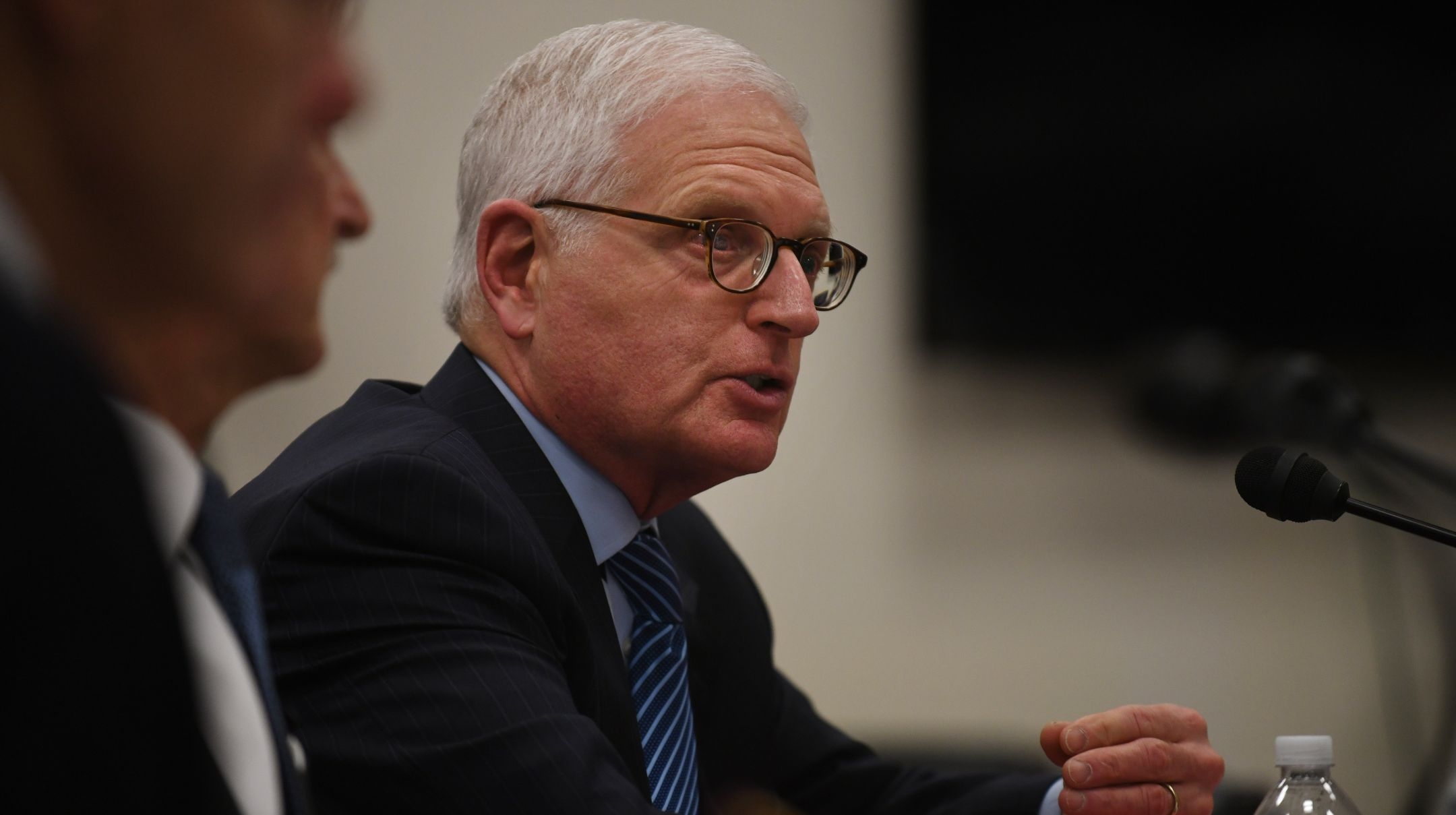Howard Kohr, longtime AIPAC director, announces retirement
Under Kohr’s leadership, AIPAC has traversed five presidencies, and the launch of political action committees aimed in part at stemming the rise of the Israel-critical left among Democrats

Howard Kohr, CEO of AIPAC, testifies before the House Appropriations Committee in Washington, D.C. March 12, 2019. (Astrid Riecken/Getty Images)
WASHINGTON (JTA) — Howard Kohr, the CEO who has led the powerhouse American Israel Public Affairs Committee since 1996, is set to retire by the end of this year.
Under Kohr’s leadership, AIPAC has traversed five presidencies and more than 10 Israeli elections. In that time, its budget and staff have enjoyed significant growth as it has become one of the best known and most powerful lobbies in Washington. During his tenure, the United States’ military aid to Israel increased to $3.8 billion per year, and AIPAC has been a leader in adding sanctions on Iran. In the last election cycle, 98% of the candidates its eponymous PAC endorsed won their races.
Before the onset of the pandemic, the lobby’s annual conference would bring up to 18,000 people to the nation’s capital — the largest Jewish gathering of the year. The final day of the conference would see cohorts of loyal activists take a three-point lobbying agenda to their representatives on Capitol Hill. Within weeks those items will often be the talk of the Capitol and on their way to passage.
Kohr’s decades also saw their share of controversy, especially in recent years: There was an espionage scandal in which two of its former employees were ultimately vindicated; a bruising fight with President Barack Obama over the Iran nuclear deal, which ultimately passed over AIPAC’s objections; and the launch of political action committees aimed in part at stemming the rise of progressive Democrats who are outspoken critics of Israel. Its actions have come at the cost of increasing hostility from progressive Democrats. Since 2020, it has not held a large national conference.
“With your support, Richard Fishman (z”l) and I spent our careers advancing our shared mission and ensuring that AIPAC was always able to strengthen and expand the U.S.-Israel relationship,” Kohr said in an email Tuesday to the AIPAC board announcing his plans and referencing Fishman, his co-CEO and brother in arms at the lobby, who died unexpectedly in late October.
Kohr, 68, had long wanted to retire at the end of this year, insiders said, and planned last October to announce his exit with Fishman. But Hamas’ Oct. 7 attack on Israel, the ensuing war and Fishman’s death led Kohr to delay the announcement.
At least until recently, AIPAC’s influence with both parties was a given, in large part because of Kohr’s formidable fundraising skills. The lobby was in 2022 worth $164 million, up from $105 million in 2011, according to tax returns. A spokesman said staff had grown during Kohr’s tenure from 40 to 300.
Kohr steered AIPAC through the arrest in 2004 of two of its top employees, including his onetime mentor, Steve Rosen, on charges they had accepted classified information. One of the first acts of the Obama administration’s Justice Department in 2009 was to throw out the case, after years of objection from civil libertarians who said it infringed on First Amendment rights.
Kohr also spearheaded AIPAC’s opposition to the deal with Iran, which traded sanctions relief for rollbacks in its nuclear policy and which Israeli Prime Minister Benjamin Netanyahu railed against bitterly, including in a controversial speech to Congress. Obama’s successor, Donald Trump, exited the deal in 2018.
AIPAC two years ago ended its longstanding policy of keeping out of direct involvement in congressional elections. It launched a conventional political action committee, AIPAC PAC, that backed 365 candidates in 2022, with a 98% success rate. A parallel super PAC, United Democracy Project, spent millions to keep Israel-critical progressives from winning primaries, which has spurred a backlash against the lobby among some Democrats.
In a separate email to the board, AIPAC President Michael Tuchin, its board chair, Betsy Berns Korn, and its President-elect, Bernie Kaminetsky, all but said Kohr was irreplaceable. All three were on the search and selection committee, and an outside firm, Stanton Chase, had been hired to conduct the search.
“His mark on the U.S.-Israel relationship will forever be felt,” they said. “Howard’s remarkable leadership enabled us to navigate changing landscapes in Washington and Jerusalem to effectively strengthen the alliance between the United States and Israel. “
This article originally appeared on JTA.org.
















